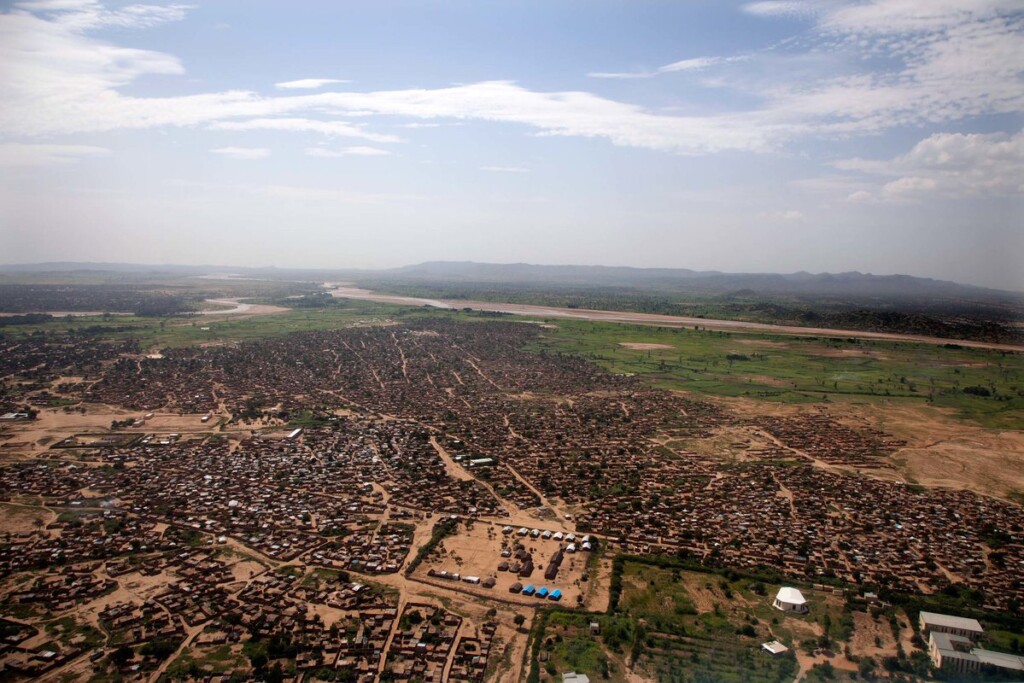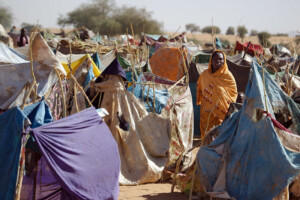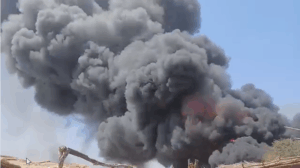Large parts of Central Darfur capital resemble a ‘ghost town’

An aerial view of Zalingei, capital of Central Darfur, in 2013 (File Photo: Albert González Farran / UNAMID)
Life in Zalingei, capital of Central Darfur, has become extremely difficult as battles between the Rapid Support Forces (RSF) and the Sudanese Armed Forces (SAF) continue. Thousands have fled the besieged city. Paramilitaries of the RSF and allied militant tribesmen are continuously assaulting people on a large scale in the state capital and surroundings.
Since mid-May when the fighting between the SAF and RSF spread to Zalingei, more than 180 people have been killed and nearly 220 were injured. Communications networks broke down and have not been restored since, Abdellatif Ishag, who recently fled from the city, told Radio Dabanga yesterday.
The majority of the deaths were caused by missiles and stray bullets, he said. “Most of the people here are traumatised with the sounds of shelling and shooting.”
At least 3,000 families have fled their homes. Most of them fled to the northern neighbourhoods of Zalingei and the El Hasaheisa and Hamidiya camps for displaced people in the outskirts of the city, Ishag said.
“The SAF now controls the army command and other SAF sites in the city, while the RSF control the main roads, the police station, and government and other offices,” he explained. “Moreover, there are more than 100 RSF checkpoints between Zalingei and Nyala.”
Ishag seriously criticised the SAF for “not leaving their bases to protect the people”.
The RSF announced on Thursday that they released 75 members of the 21st Infantry Division based in the city.
Ethnically targeted
The RSF are holding at least 60 people incommunicado in the city. “Some of them were detained since the outbreak of the fighting on May 17,” Ishag reported. “Among them is the former Central Darfur Humanitarian Aid Commissioner Yousef Abakar.”
He said that the RSF are holding people on suspicion of links with the army, and added that “the detentions are mainly based on the tribe to which people belong. No Arabs have been seized.”
He said that the residents living in the parts of Zalingei controlled by the RSF are subject to searches and widespread plundering. RSF members and allied militant tribesmen also kidnap people and ask large sums of money for their release.
‘Ghost town’
“Most parts of Zalingei now resemble a ghost town” Ishag said. “There is hardly any water and food anymore.
“The RSF has seized all the water bottles, generators, and solar cells,” he said.
“The closure of the main roads to the city and the Zalingei Grand Market, in addition to the departure of all civil society and aid organisations, has led to an acute scarcity of food.”
He further reported the spread of malaria, and a growing number of diarrhoea cases.
The Zalingei Teaching Hospital has partially resumed its work, after it was plundered, although many staff members have fled. “The emergency departments, the blood bank, the laboratory, and the dialysis centre are treating patients again, thanks to the efforts of volunteers of a youth initiative,” Ishag stated.
“Wounded who could not be transported to the hospital have been treated by doctors, nurses, or paramedics at home – without medicines, as almost all pharmacies were plundered.”
Prominent Sudan researcher Eric Reeves tweeted already in early July that “Zalingei is a city that is slowly being strangled by the Janjaweed [read: RSF and allied militant tribesmen ed]”.











 and then
and then